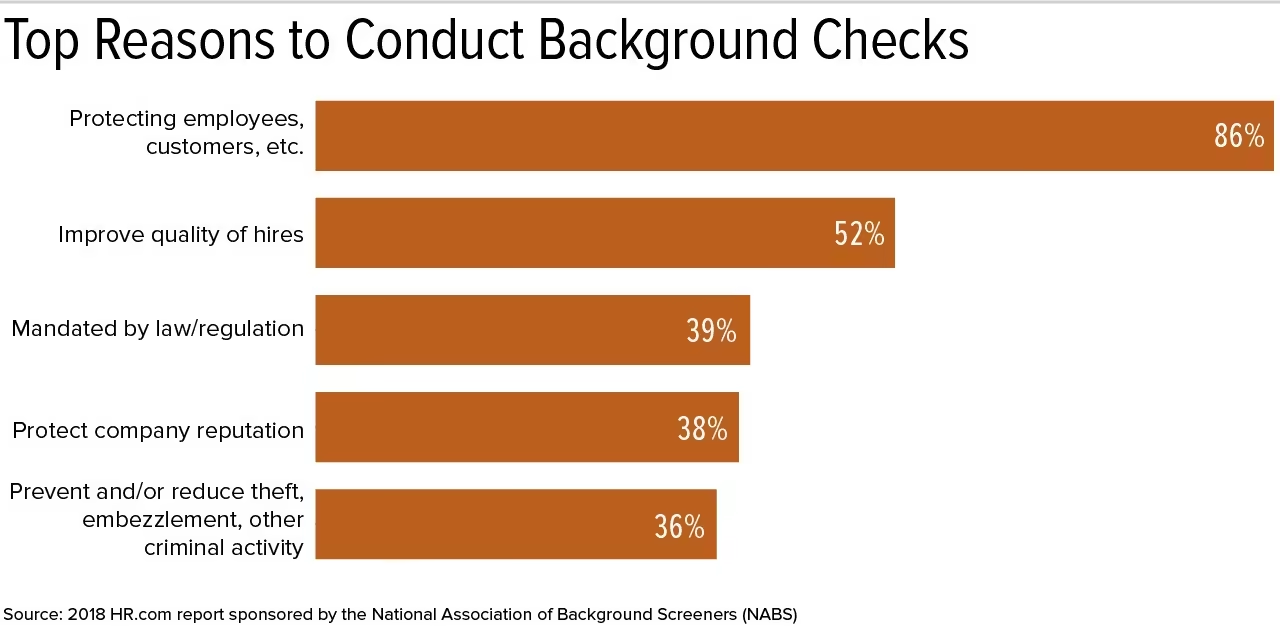During the hiring process, most companies pre-screen potential employees. They recognize that doing pre-employment background checks reduces the risk to their company, workers, and consumers. The organization also considers that a persons past behaviors will influence their present and future behavior.
What if an applicant passes a background check but then goes on to commit a crime? Is it possible for an employer or hiring manager to assume that a background check is valid for a set period of time?
Employers should be aware of the various types of background checks available—as well as how far back every kind of check can go—to make informed decisions about who they hire, confirm their qualifications for the position, and reduce risk to other employees, volunteers, clients, or your companys reputation.
Because the length of history that can be checked in a candidates background varies depending on the background check, its necessary to understand the factors that can influence the length of history that can be examined legally. Compliance requirements in some states and towns, for example, may limit how far back you can go.
Various background checks look for different things and cover different periods in a candidates working life. Background checks usually cover seven years of criminal and judicial records, but they can go further depending on compliance rules and the information sought.
Keep in mind that where you recruit impacts the rules, regulations, and compliance for various forms of background checks, including how far back in a persons past can be reviewed and what can be checked.
Background/Reference Checks: What Are They and How Do They Work?
There are many different forms of pre-employment background checks available today, and companies often use a combination of them to meet their needs. The following are some of the most frequent types.
History Of employment
On their resumes, some people provide phony employment histories. Employers regularly uncover fabrications about job responsibilities. Employees can lie about skill sets, dates of employment, past employers, and job titles and duties. HR specialists should contact previous employers to confirm:
- Employment dates are listed.
- Occupational title (s).
- Duties were completed.
- Separation circumstances.
History of education
Academic degrees that were never earned or educational institutions that were never attended are other prevalent resume lies. One high-profile case included the Massachusetts Institute of Technology admissions dean, who resigned after it was revealed that she had falsely claimed to hold three degrees.
History of crime
The rise in claims alleging that an employer was negligent in hiring or retaining an employee who later engaged in workplace violence or some other activities that resulted in harm to a person (e.g., sexual assault) or property (e.g., the workplace) has prompted employers to use criminal background checks to pre-screen job applicants.
What is the duration of a background check?
What Makes a Background Check Invalid?
Lets imagine an employee, or even a volunteer, breezed through a pre-employment check. That individual has been employed for 5, 10, or even 20 years. Perhaps the volunteer does the same work year after year, such as a youth camp counselor. There could have been a lot of changes in that period. Are you certain that your customers are still safe? Are you certain that your company will not be held accountable for poor recruiting practices?
A good rule of thumb for the validity of a background check is two to five years, but some conditions may need re-screening.
Employers primary means of obtaining information about potential hires from sources other than the candidates themselves are background investigations and reference checks. A background check entails evaluating whether an applicant is unqualified for a position owing to a criminal past, motor vehicle offenses, poor credit history, or educational or employment history deception. Generally, a reference check entails contacting an applicants prior employers, supervisors, co-workers, and instructors to verify previous employment and acquire information about the individuals knowledge, skills, abilities, and character.
How Often Should You Screen Your Employees?
As previously said, most businesses only conduct background checks when new employees are hired. However, there is a growing trend among businesses to conduct rolling background checks or continual screenings on current employees to avoid any potential accusations of negligence or workplace violence.
So, how often should you re-screen your employees? There are just too many unsolved questions to provide a single response:
- Is it mandatory for your company to do background checks on its personnel regularly?
- Is there anyone on your team who works with a vulnerable demographic, such as children, the elderly, or currently undergoing medical treatment?
- Is the employee taking on additional obligations that they werent previously assigned?
Conduct for the Following Reasons
Employers do appropriate screening levels for prospective employees for a variety of reasons, including conducting a background investigation, a reference check, or both. The following are the top reasons, according to the 2018 HR.com/NABS report:
SAFETY
A key motivation for doing background and reference checks is to protect the employer or others from harm or legal liability of various kinds. Other employees may be harmed as a result of sexual harassment or workplace violence.
- Sexual assault on business premises, for example, could harm the organizations clients.
- The general public is harmed as a result of careless driving.
- The employers business, either financially or in terms of image and reputation.
A strong reason to perform in-depth criminal history searches of job applicants is to defend against legal claims such as negligent hiring. A multilevel jurisdictional criminal records check can be solid evidence that the company took reasonable precautions while hiring.

Productivity Maximization
The adage says, "hire the best and fire the rest." Past performance is usually a good predictor of future performance, and it can reflect a persons professionalism, productivity, job skills, and interpersonal communication skills. A reference check might help you tell the difference between a genuine high flyer and a phony.
What Can A Pre-Employment Background Check Tell You?
Employers may check a candidates criminal and/or civil court records, driving records, and credit history, as well as verify education or professional licenses and job history, depending on your jurisdiction, the search you use, and the position youre hiring for. Learn more about what a background check reveals.
Depending on state and federal legislation, some time limits may apply to what can be found on an employment background check.
Suppose the compensation for the position youre hiring for is less than $75,000. In that case, you should include some facts (such as civil judgments, government sanctions, and professional license punishments, for example) that will help you make an informed decision.
However, if the compensation for the position is $75,000 or more, even if it is older than seven years, that information may appear in the results.
When it comes to background checks, how far back should employers go?
Some jobs need you to go back further than others, such as those who work with at-risk populations, the general public, or vulnerable populations and persons unable to care for themselves. If the law allows it, employers may search further back during a background check than the time mentioned above.
But keep in mind that background checks are governed both federally and state-by-state, so make sure to adhere to the existing rules and laws.
Whether youre applying for a job as a bank teller or a day-care provider, you may be concerned about what your background check will reveal and how far back your potential employer will look. Prepare by learning about the legislation in each state and how the Fair Credit Reporting Act applies to them.
The recommended time frame for looking back on an individuals background for criminal records and credit reports is seven years. A minimum of seven years is recommended for job history, with longer periods in circumstances where there is a hiatus in employment or an individual has changed careers or industries. If youre looking for criminal records, work records, or school records, a search that goes back more than seven years may take a little longer. However, if the person is in a specific job, the time spent is worthwhile.
A background check is an important aspect of the hiring process. Even if you can run a background check on your own, you risk acquiring inaccurate information or putting your company in danger of non-compliance. Instead of chasing down background checks, you should spend your time and effort drafting job descriptions, conducting interviews, and performing reference checks. Its advisable to select a third-party background check company with a lot of experience in giving accurate results. As a result, you shouldnt hire just any screening company to do your background checks.
This article was written by Trish Makiwa, a consultant at the Industrial Psychology Consultants, a management and Human Resources Consulting company. She can be contacted at trish@ipcconsultants.com




